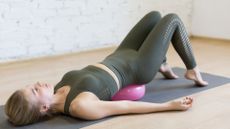Meditation can reduce the signs of stress in your hair, study finds
By measuring levels of stress hormones in your hair, researchers found a 25% reduction in six months


Stress can be a helpful response in certain situations. When our fight-or-flight system activates, we're more alert to danger, blood flows more readily to our muscles, and our heart rate increases. These are short-term changes to get us through the immediate situation we find ourselves in.
However, longer-term stress can be overwhelming and debilitating. That's why many people learn how to meditate, as developing a regular practice and becoming more mindful has been repeatedly shown to reduce stress. Now, research has found that meditating can also reduce the signs of stress found in our hair.
Using hair cortisol to understand stress response changes over time, alongside self-reported measures, the study found that daily meditation began to reduce chemical stress levels after around three months, achieving the most significant changes by month six. On average, the participants saw a drop of about 25 percent.
Most meditation-based studies to date tend to use an 8 to 12-week training program for their participants. In contrast, this research suggests that chronic or long-term stress only starts to decrease at the three-month mark. There's also an interesting suggestion of why these findings possibly contradict previous research.
When joining a study, you'll be told what the research is for, and many people are also aware of meditation's stress-reducing effect. So, they enter into the study believing that they'll lower their stress, potentially (and unknowingly) causing them to report reduced stress through a process known as the placebo effect.

The researcher's decision to use hair cortisol meant they had a controllable, measurable, objective standard of stress levels over time. As a result, the results should be more reliable and repeatable. This sounds like an academic point, but it means that three-month programs may be less effective for stress reduction than six-month ones.
This is possible because our nervous system releases cortisol into our bloodstream, but the amount in our blood varies over time and shifts about a lot during the day. If you take a blood sample, you'll only be able to detect cortisol levels at the exact moment the blood was drawn.
Get the Fit&Well Newsletter
Start your week with achievable workout ideas, health tips and wellbeing advice in your inbox.
Interestingly, the chemicals and hormones in our blood become stored in our hair cells as they grow. The ends of your hair represent the oldest data, while the areas closest to your scalp contain the most current levels. It's for this reason that hair samples are often used for drug testing.
Although the timescales differ, this research adds to the already well-documented stress-reducing effects of a regular meditation practice. However, this isn't the only way to develop a more mindful approach to the day. Many people liken yoga to meditation, with some even referring to it as 'moving meditation.'
Where meditation helps you train your mind, yoga promotes the connection between the breath, mind, and body. Laying one of the best yoga mats beneath your feet, you can explore the benefits of the practice with these 15-minute morning yoga routines to start your day off right.

James is a London-based journalist and Fitness Editor at Fit&Well. He has over five years experience in fitness tech, including time spent as the Buyer’s Guide Editor and Staff Writer at technology publication MakeUseOf. In 2014 he was diagnosed with a chronic health condition, which spurred his interest in health, fitness, and lifestyle management.
In the years since, he has become a devoted meditator, experimented with workout styles and exercises, and used various gadgets to monitor his health. In recent times, James has been absorbed by the intersection between mental health, fitness, sustainability, and environmentalism. When not concerning himself with health and technology, James can be found excitedly checking out each week’s New Music Friday releases.
-
 A personal trainer says "you’ll never do sit-ups again" after trying these five exercises
A personal trainer says "you’ll never do sit-ups again" after trying these five exercisesWorkout I tried her recommended moves—here’s what I thought
By Jennifer Rizzuto Published
-
 This small Pilates tool can tone your entire body—here’s how to use it
This small Pilates tool can tone your entire body—here’s how to use itPilates Small, affordable and surprisingly effective
By Jennifer Rizzuto Published